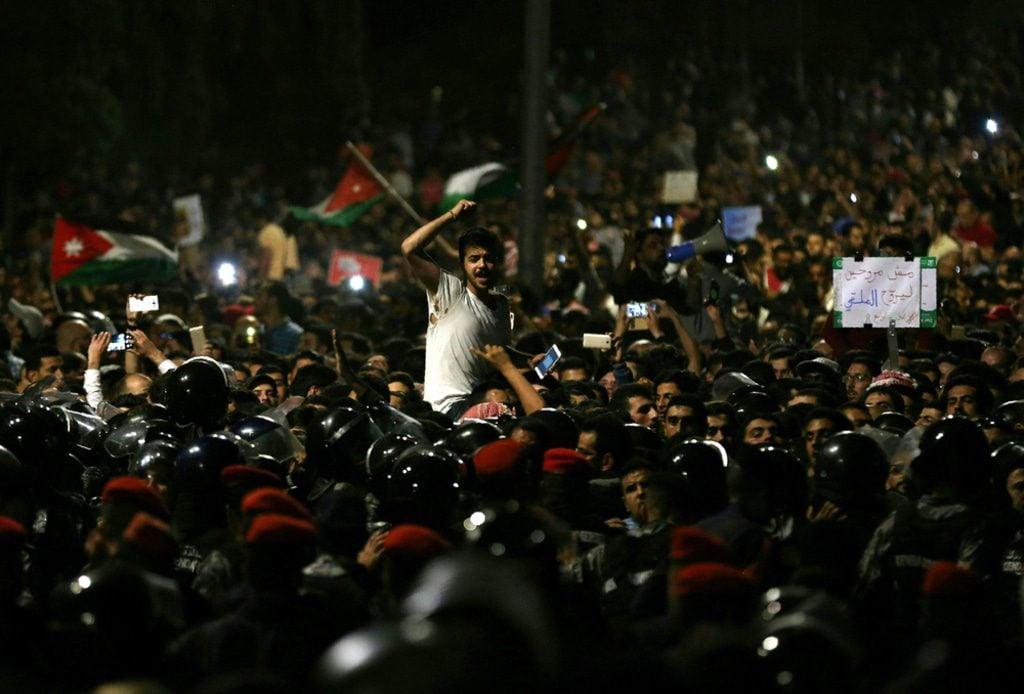
The largest protests in years have erupted in Jordan over a draft income tax law, bringing thousands to the streets in the capital Amman and elsewhere.
The bill, approved by the Jordanian cabinet on 22 May 2018, would lower the income level at which citizens are exempt from taxes from 12,000 to 8,000 Jordanian dinars (JD) (from about $17,000 to $11,000) a year for individuals, and from 24,000 to 16,000 JD (from about $34,000 to $23,000) for families.
The proposed law would also eliminate some other exemptions available for expenses, including medical treatment, education and rent, as well as increasing the tax rate for all income brackets and corporations.
The proposed increases, along with plans to raise fuel and electricity prices by up to 5.5 per cent and 19 per cent respectively, angered large segments of the population.
The controversial measures were part of a package of economic reforms backed by the International Monetary Fund (IMF) to reduce deficits. The IMF approved a $723 million loan to Jordan in 2016, and in exchange has pushed for various financial measures, including a new income tax law.
The IMF has also advised ‘the Jordanian authorities to gradually remove large tax exemptions and subsidies, including those on fuels and gas’.
The proposed tax hikes would increase revenues by about 300 million JD a year ($423 million), officials project. Yet trade unions, youth groups and others claim that the gains to the government would come at the cost of some of the neediest members of society, who are already struggling with the rising cost of living ang high unemployment levels.
Unions called a general strike on 30 May 2018, with 33 associations representing a broad cross section of industries participating. The strike was followed by days of mass protests in cities across the country. According to the state-run Petra News Agency, protesters blocked roads, and burned tires and garbage cans.
Police fired tear gas to prevent protesters getting near to the cabinet office in Amman, and scuffles broke out between protesters and police in some areas.
Protesters called for the resignation of Prime Minister Hani Mulki, but they are also “placing the blame at the king’s door”, said Lamis Andoni, a Palestinian-Jordanian journalist who attended the protests.
“They’ve alienated many allies of the king [with the proposed tax law], many allies including staunch loyalists,” Andoni said. “And they tapped into accumulating frustrations and feelings of betrayal and feelings among many, many Jordanians, outside Amman especially, and inside Amman in poorer areas…that the state has totally abandoned them.” However, Andoni said that at this point it seems unlikely the government will scrap the tax plan.
King Abdullah, however, does appear poised to remove Mulki in an attempt to appease protesters, Reuters reported, citing unnamed political sources. Andoni said she was unsure if that would be enough to quell the protesters’ anger.
The king also appeared to make a concession to protesters on 1 June by ordering the government to freeze the proposed electricity and fuel price increases.
According to Petra News, he also called on the “government and the National Assembly to lead a comprehensive and rational national dialogue to reach consensus on the draft tax law so as not to burden people, fight evasion and improve the efficiency of collection”, adding that it is “not fair that citizens alone bear the consequences of financial reforms”.
Separately, Mulki met with trade union representatives and agreed to form a committee “of concerned ministers and trade unions…to study the civil service system and the amendments thereto, and to remove any negative impact”. The committee is due to complete its work and submit its report before the Eid al-Fitr holiday around 15 June.
Speaker of the House of Representatives Atef Tarawneh told reporters that a majority of the deputies also want the government to withdraw the tax bill. Unions and other opponents of the bill continued to call for protests and another general strike.
The protests are the latest sign that Jordan’s economic woes are taking their toll. Although the kingdom has, for the most part, remained politically stable, it has seen its tourist industry slump in recent years as a result of the war in neighbouring Syria as well as internal issues, including recruitment by extremist groups. In December 2016, militants overran a Crusader castle in the city of Karak, and ten people – including a Canadian tourist – were killed in the resulting gun battle with security forces.
Jordan is also hosting more than 740,000 refugees – most of them Syrian – making it the country with the second highest share of refugees compared to its population in the world, and adding further strain to the economy and infrastructure. Although international donors have put in substantial amounts of aid, it has not been enough. As of May 2018, UNHCR, the UN Refugee Agency, reported that it had received only $216 million of the $1 billion needed to provide aid to Syrian refugees and vulnerable host communities in Jordan for 2018.
Unemployment has been on the rise, reaching 18.5 per cent at the end of 2017. The ratio of government debt to gross domestic product has also grown exponentially over the past decade and now stands at more than 95 per cent.
The proposed tax law is the latest test for a government that is frequently caught between the interests of its external backers and the demands of its population. Besides the anger around the economic measures, the kingdom’s relationship with Israel has been the target of much popular outrage, particularly given that a majority of Jordan’s population is of Palestinian descent.
The anger boiled over in July 2017 after a security guard from the Israeli embassy shot and killed two Jordanians. The embassy was closed for several months as a result, reopening in January 2018.


